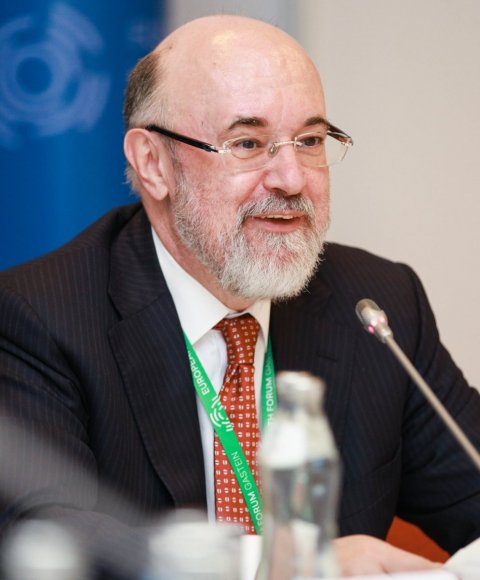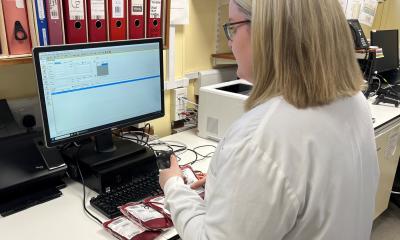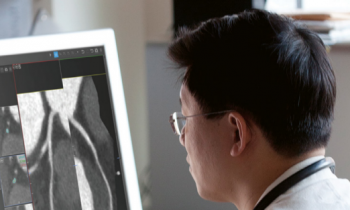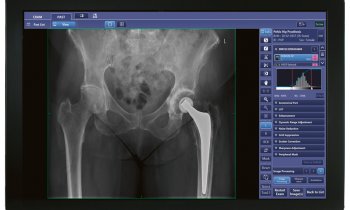Article • Digital transformation
Disrupting healthcare: Necessary change or destruction?
Dr Clemens Martin Auer knows ‘disruption is an ambivalent concept’. Auer is president of the European Health Forum Gastein (EHFG), in which healthcare policy is discussed annually from a European perspective:
Report: Michael Krassnitzer

‘For some, disruption is the promise of necessary change whilst for others it means suspicions and fears.’ The term – a synonym for ‘transformation’ but also for ‘destruction’ – was the central topic of this year’s conference titled: ‘A healthy dose of disruption? Transformative change for health and societal well-being’. Auer comes to the point when he asks: ‘How do we find the right measure of transruption in the healthcare sector?’
One of the great disruptors in healthcare is without a doubt digitisation. ‘The digital transformation offers the opportunity no longer only to react to disease but rather for us to increasingly dedicate ourselves to proactive and preventive treatments,’ stresses Professor Ran Balicer, founding director of the Clalit Research Institute (Israel). However, it also brings with it great changes: ‘If we look at the digital transformation, the key word is not “digital” but “transformation”, Balicer emphasises. ‘It makes no sense to promote digitisation of healthcare without first effectively revolutionising the fundamental care processes. In other words: if you digitise a defective clinical process, then you get an expensive defective digitised process.’
The EU invests in AI
The EU invests in and supports the development of the ‘digital transformation’ often cited at the EHFG 2019. The European Commission is currently working on a strategy to support artificial intelligence (AI) at EU level that also includes the use of AI in healthcare, as Marco Marsella, head of the General Direction Communications Networks, Content, and Technologies (DG CONNECT) explains: ‘The digital transformation will be data driven.’ So, at one conference session one could learn how the European Centre for Disease Control (ECDC) uses ‘big data’ for surveillance of nosocomial infections, or who the World Health Organisation (WHO) localises disease outbreaks in the context of EIOS (Epidemic Intelligence from Open Sources) based on indicators in the media – both classical and social formats.
Of course, EHFG 2019 also tries not to forget the human side, the ‘human touch’ in the digital transformation. ‘If these new technologies are implemented, attention must be given not to marginalise parts of the population,’ warns Dr Indra Joshi, who, as Digital Health & AI Clinical Lead in the British National Health Service (NHS), is responsible for the introduction of an app that enables access to a series of services. This is especially important in the case of vulnerable population groups, such as the aged who feel insecure with modern technologies, or migrants who might not speak the local language: ‘They must be able to choose whether they want to care for their treatment digitally, or prefer to consult a physician personally.’
There is a second key word in the conference title: ‘well-being’ – an allusion to Finland’s presidency of the European Council. The Scandinavian country has placed well-being – and hence a health issue in the widest sense – high up on its agenda while currently presiding over the EU Council. ‘People who feel well are less frequently ill, work, are innovative and pay taxes,’ Dr Paivi Sillanaukee, General Director of the Finnish Ministry for Social Affairs and Health, explains: ‘In aging populations well-being has a countervailing effect also for the rise in costs of social services and healthcare.’ The demand for equal status, improved employment options for women, as well as the compatibility of professional and private life, are central objectives of the ‘Economy of well-being’ propagated by Finland.
Image source: Shutterstock/Olivier Le Moal
The European Semester
‘The instrument for implementing our program is the ‘European Semester’, explained Sillanaukee. This is a budgetary instrument that permits the EU to perform an early review of national budget and reform bills before these are adopted by the national parliaments. Every year in May, the European Commission publishes proposals on this basis as to what it feels each individual country could do better. Funds are tied to these ‘recommendations’. So, if a country does not fulfil the demands, then it loses money. The high-ranking Finnish civil servant is convinced that ‘the legitimacy of the Union among the citizenry is strengthened if well-being is given a clear priority among the EU’s long-term objectives.’
Profile:
Dr Clemens Martin Auer is the special commissioner for health in the Austrian Federal Ministry for Health and Social Affairs, as well as president of the European Health Forum Gastein. The high-ranking Austrian civil servant performed a central function in all essential stages of healthcare reform in his country. This also included the introduction of the electronic health file (ELGA) in Austria. Auer, who studied philosophy and political science in Vienna, was most recently co-chair of the eHealth Network, the responsible agency head within the EU and, as coordinator of the EU eHealth Governance Initiative, responsible for the strategic orientation of the common eHealth policy of the Member States.
31.10.2019











